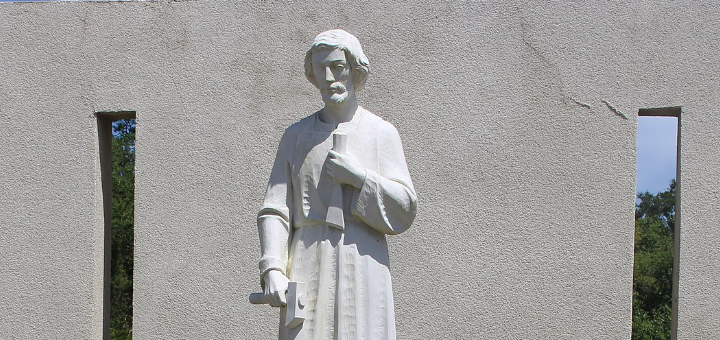
 St. Joseph Academy, St. Augustine, St. Johns County, Florida. Michael Rivera [CC BY-SA 4.0], via Wikimedia Commons[/caption]Flávia Ghelardi writes from Brazil in English and Portuguese. Jump to the English version of this post.
O trabalho normalmente é associado a uma pena, uma punição, uma coisa muito ruim que somos “obrigados” a fazer. Por outro lado, o trabalho, para algumas pessoas, se tornou um verdadeiro vício, sugando todo o tempo disponível e todas as energias. Mas qual é então o verdadeiro valor do trabalho?
O trabalho pode ser definido como o conjunto das atividades, produtivas ou criativas, que o ser humano exerce para atingir determinado fim. É a forma de colaborarmos no trabalho criador de Deus e é um aspecto fundamental da vocação humana. Ele é necessário para a plena realização e a felicidade humana e nele está intrínseca a responsabilidade pela administração de todas as coisas do mundo.
Desta forma, o trabalho precisa ser devidamente valorizado, como forma de colaboração para o bem-estar de todos e deve ser executado com o máximo zelo e responsabilidade, não importando a sua natureza. “Qualquer trabalho, ainda que ingrato, oferece ao cristão um meio de louvar a Deus”, ensina o Pe. José Kentenich. As crianças, desde pequenas, precisam aprender o devido valor do trabalho, realizando tudo o que os pais pedirem, da melhor forma possível e sem reclamações.
Essa parte, de fazer o que deve ser feito, sem reclamar, realmente não é fácil. Nossa tendência é buscar sempre o mais cômodo, o mais fácil e quando precisamos empregar algum tipo de esforço, a vontade é se rebelar reclamando. Porém, uma vez que entendemos que aquilo que nos é solicitado pode ser feito como prova de amor, é mais fácil conter a rebeldia da vontade. Os filhos normalmente seguem o exemplo dos pais: se ouvem os pais resmungarem, vão resmungar; mas se percebem que os pais, mesmo cansados, realizam o trabalho com alegria, aprendem também a enxergar as obrigações da mesma forma.
Nós podemos demonstrar o nosso amor a Deus e aos outros através da forma que executamos nosso trabalho, seja ele qual for. Se colocamos uma boa dose de sacrifício, procurando fazer tudo da melhor forma, certamente nos aproximamos mais de Deus e daqueles a quem estamos servindo com nosso trabalho.
É claro que o trabalho também pode ser uma fonte de prazer, quando fazemos aquilo que gostamos. Neste caso, precisamos cuidar para não cair no extremo oposto: supervalorizar o trabalho e deixar nossas outras responsabilidades, como o relacionamento com Deus e com o próximo (especialmente nossa família), em segundo plano. Portanto, para ter uma correta relação com o trabalho, precisamos fazer as seguintes perguntas:
St. Joseph Academy, St. Augustine, St. Johns County, Florida. Michael Rivera [CC BY-SA 4.0], via Wikimedia Commons[/caption]Flávia Ghelardi writes from Brazil in English and Portuguese. Jump to the English version of this post.
O trabalho normalmente é associado a uma pena, uma punição, uma coisa muito ruim que somos “obrigados” a fazer. Por outro lado, o trabalho, para algumas pessoas, se tornou um verdadeiro vício, sugando todo o tempo disponível e todas as energias. Mas qual é então o verdadeiro valor do trabalho?
O trabalho pode ser definido como o conjunto das atividades, produtivas ou criativas, que o ser humano exerce para atingir determinado fim. É a forma de colaborarmos no trabalho criador de Deus e é um aspecto fundamental da vocação humana. Ele é necessário para a plena realização e a felicidade humana e nele está intrínseca a responsabilidade pela administração de todas as coisas do mundo.
Desta forma, o trabalho precisa ser devidamente valorizado, como forma de colaboração para o bem-estar de todos e deve ser executado com o máximo zelo e responsabilidade, não importando a sua natureza. “Qualquer trabalho, ainda que ingrato, oferece ao cristão um meio de louvar a Deus”, ensina o Pe. José Kentenich. As crianças, desde pequenas, precisam aprender o devido valor do trabalho, realizando tudo o que os pais pedirem, da melhor forma possível e sem reclamações.
Essa parte, de fazer o que deve ser feito, sem reclamar, realmente não é fácil. Nossa tendência é buscar sempre o mais cômodo, o mais fácil e quando precisamos empregar algum tipo de esforço, a vontade é se rebelar reclamando. Porém, uma vez que entendemos que aquilo que nos é solicitado pode ser feito como prova de amor, é mais fácil conter a rebeldia da vontade. Os filhos normalmente seguem o exemplo dos pais: se ouvem os pais resmungarem, vão resmungar; mas se percebem que os pais, mesmo cansados, realizam o trabalho com alegria, aprendem também a enxergar as obrigações da mesma forma.
Nós podemos demonstrar o nosso amor a Deus e aos outros através da forma que executamos nosso trabalho, seja ele qual for. Se colocamos uma boa dose de sacrifício, procurando fazer tudo da melhor forma, certamente nos aproximamos mais de Deus e daqueles a quem estamos servindo com nosso trabalho.
É claro que o trabalho também pode ser uma fonte de prazer, quando fazemos aquilo que gostamos. Neste caso, precisamos cuidar para não cair no extremo oposto: supervalorizar o trabalho e deixar nossas outras responsabilidades, como o relacionamento com Deus e com o próximo (especialmente nossa família), em segundo plano. Portanto, para ter uma correta relação com o trabalho, precisamos fazer as seguintes perguntas:
- Estou realizando esse trabalho da melhor forma possível, com zelo, diligência, sem procrastinação?
- Com a dedicação a esse trabalho, também disponho de tempo para me relacionar com Deus e com o próximo?
- Faço o trabalho com boa disposição, oferecendo o sacrifício como forma de demonstrar meu amor, ou sempre reclamo de cumprir minhas obrigações?
The Value of Work
Work is usually associated with a penalty, a punishment, a very bad thing that we are “required” to do. On the other hand, work, for some people, has become a real addiction, sucking up all the time and energy they have available. But what then is the true value of work? Work can be defined as the set of activities, productive or creative, that the human being performs to achieve a certain end. It is the way we collaborate in God's creative work and is a fundamental aspect of the human vocation. It is necessary for human fulfillment and happiness, and in it is the responsibility for the administration of all things in the world. In this way, work must be properly valued as a form of collaboration for the well-being of all and must be performed with the utmost care and responsibility, regardless of its nature. “Any work, however ungrateful, offers the Christian a way of praising God,” teaches Fr. Joseph Kentenich. Children, from an early age, need to learn the proper value of work by doing whatever their parents ask, in the best possible way and without complaint. This part of doing what should be done without complaining is really not easy. Our tendency is always to look for the most comfortable, the easiest and when we need to employ some kind of effort, the will is to rebel complaining. But once we understand that what we are asked to do can be done as proof of love, it is easier to contain the rebellion of the will. Children usually follow their parents' example: if they hear their parents grumble, they will grumble; but if they realize that even tired parents do the work with joy, they also learn to see their obligations in the same way. We can show our love for God and others through the way we do our work, whatever it may be. If we put a good deal of sacrifice into doing our best, we are certainly closer to God and those we are serving with our work. Of course, work can also be a source of pleasure when we do what we enjoy. In this case, we need to be careful not to fall into the opposite extreme: overvaluing our work and leaving our other responsibilities, such as our relationship with God and our neighbor (especially our family), behind. Therefore, to have a correct relationship with work, we need to ask the following questions:- Am I doing this work to the best of my ability, with zeal and diligence, and without procrastination?
- By dedicating myself to this work, do I also have time to relate to God and to others?
- Do I do my job willingly, offering sacrifice as a way of showing my love, or do I always complain about fulfilling my obligations?
Copyright 2019 Flávia Ghelardi
About the Author

Flávia Ghelardi
Flávia Ghelardi is the mom of four, a former lawyer already "promoted" to full time mom. Flávia published her first book FORTALECENDO SUA FAMÍLIA and is a member of Schoenstatt´s Apostolic Movement. Flávia loves to speak about motherhood and the important role of women, as desired by God, for our society. She blogs at www.fortalecendosuafamilia.blogspot.com.


.png?width=1806&height=731&name=CatholicMom_hcfm_logo1_pos_871c_2728c%20(002).png)
Comments